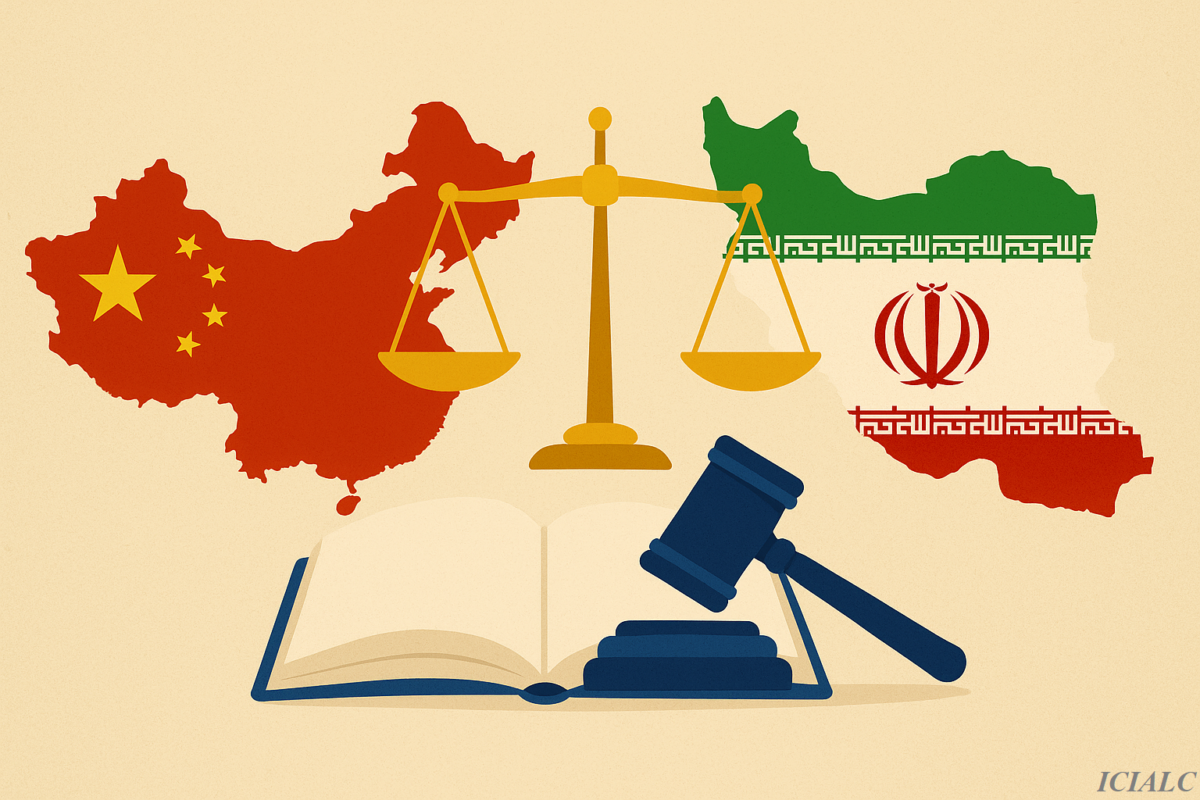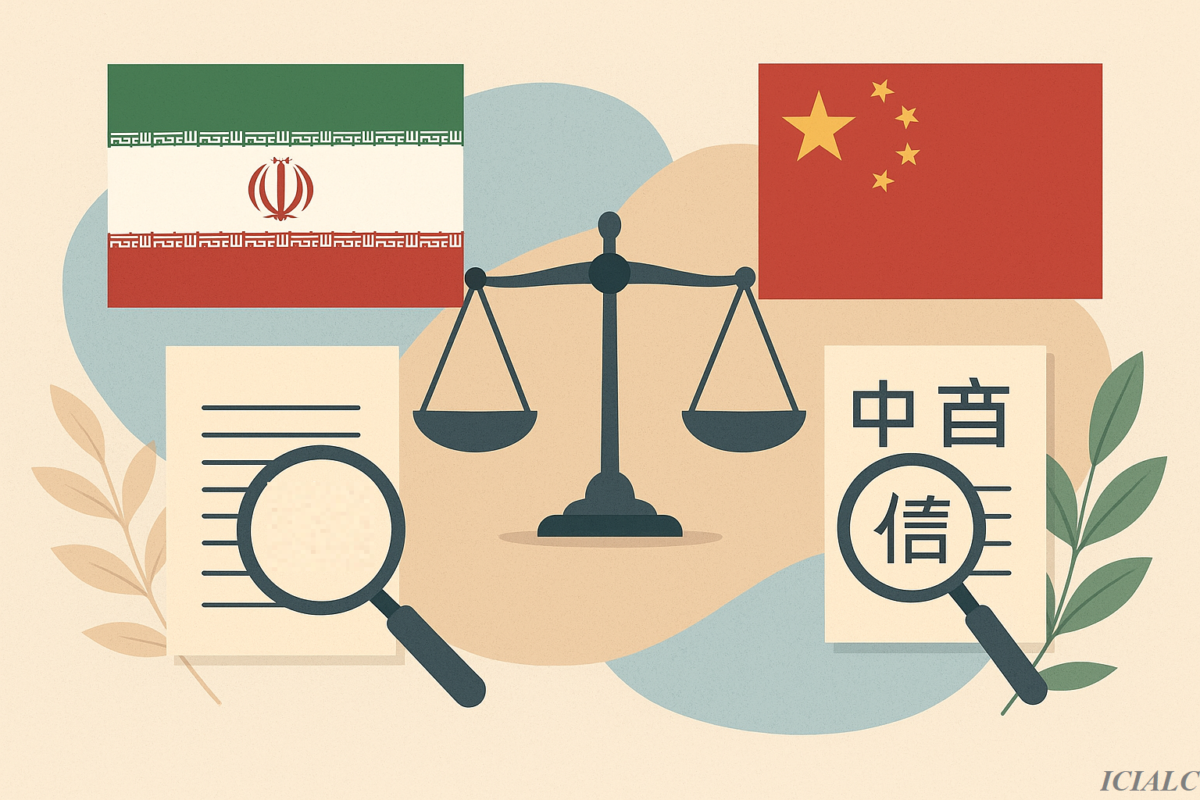In recent years, economic cooperation between Iran and China especially within the framework of the global “Belt and Road Initiative” (BRI), recognized as a major geoeconomic project—has accelerated significantly. This initiative, designed to facilitate trade between Asia, Africa, and Europe, has created unique opportunities for expanding logistical cooperation, maritime transport, and trade support between Iran and China.
Key manifestations of such cooperation include a significant rise in maritime charter contracts, cargo transportation by sea, and port services agreements in major regional and international ports. Iranian traders are increasingly cooperating with Chinese shipping firms and port operators, which has major legal as well as economic implications.
While these relationships present substantial opportunities to reduce transportation costs, enhance market access in Asia, and accelerate transit, they are also attended by legal challenges and complexities. Chief among these challenges are differences in legal systems, risks stemming from the absence of suitable arbitration clauses, language barriers and translation issues, and limited understanding of Chinese contractual structures.
This article aims to provide a comprehensive overview of the primary legal requirements in charter parties, marine cargo transport, and port services contracts with Chinese entities. It delivers practical and specialized strategies to minimize legal risks, enhance contractual transparency, and improve commercial security for Iranian industry participants.
Types of Maritime Contracts with Chinese Parties

Due to China’s rapid foreign trade growth and expanding role in global supply chains, maritime and port collaboration between Iran and China has increased sharply. China’s advanced ports (Shanghai, Shenzhen, Ningbo, Qingdao) have become central to global commerce, and major Chinese operators such as COSCO, SIPG, and CMPort are critical partners for many nations, including Iran.
A thorough understanding of the prevailing contracts in maritime transport, port operations, logistics, and chartering is essential for Iranian companies. Accurate and principled contract drafting is critical to prevent future legal disputes and to ensure the success of long-term cooperation.
Below are the main types of maritime contracts commonly used with Chinese partners, together with key legal recommendations serving as a practical guide for Iranian traders, logistics firms, port operators, and legal advisors.
Charter Party Contracts
In international maritime trade, charter parties are among the most widespread mechanisms for transporting large and intercontinental cargoes. These contracts specify the legal framework between the ship-owner and the charterer, defining how, for how long, and under what terms the vessel is utilized for transport.
Charter parties mainly fall into three categories, with the first two being most prevalent in Iran–China commerce:
1.Time Charter: Here, the ship-owner places the vessel at the charterer’s disposal for a fixed period (months or years). The owner remains responsible for technical maintenance, fueling, and crew, while the charterer exercises operational control, deciding routes and destinations. This is favored where the charterer requires frequent use of a vessel but does not want to purchase one.
2.Voyage Charter: The owner leases the ship for specific voyage(s) between designated ports to transport a load of cargo. The owner covers operating costs during the voyage, and the freight is usually based on tonnage. Spot trading for limited imports/exports typically uses this contract model.
3.Contract of Affreightment: Here, the ship-owner commits to transporting a specified volume of cargo over multiple trips during a stipulated timeframe. Though less common in Iran–China trade, it is sometimes applied for long-term export projects such as iron ore, oil, or LNG.
Essential Terminology in Charter Parties
Successful drafting and execution require proficiency in the following technical/legal concepts:
Lay time: The allotted period for loading/unloading. Exceeding it may trigger damages claims.
Demurrage: Penalty paid by the charterer to the owner for delays exceeding the allowed lay time.
Dispatch: In some contracts, if loading/unloading is completed earlier than scheduled, the owner compensates the charterer.
Off-hire: Periods when the vessel is out of service due to technical faults, repairs, or accidents, during which no hire is payable by the charterer.
Cargo Transport Contracts (Bill of Lading / Freight Contract)

The bill of lading (B/L) is a crucial document in international maritime trade, functioning both as a carriage contract and document of title. Issued by the shipping line or its agent, it evidences the agreement between the shipper and carrier to transport goods from the specified origin to a set destination.
Types of bills of lading include:
Negotiable B/L: Transferable to a new holder, who then holds title to the goods.
Non-negotiable (Straight) B/L: Only the named consignee can receive the cargo.
Electronic B/L (e-B/L): Increasingly common with Chinese companies, subject to digital infrastructure and legal considerations.
Key Clauses in B/L-Based Transport Contracts:
Carrier’s Undertaking: The carrier agrees to transport goods under specified conditions from point of origin to its destination.
Cargo Responsibility: The carrier is liable for the cargo’s safety en route, except in cases of force majeure, packaging errors, or inherent defects.
Delivery Delays: Unjustified delays entitle the consignee or shipper to claim damages; it is crucial to include force majeure or port-related restriction clauses, particularly for China.
Consignee Rights: The consignee may claim goods and, in case of damage/shortage, file suit relying on the B/L.
Key Considerations with Chinese Companies:

Some Chinese companies use internal (domestic) B/Ls or bespoke forms differing from international standards. Such documents must be reviewed by specialists in maritime law before execution, as they may inappropriately limit the carrier’s obligations or subject the contract solely to Chinese law.
Port Services Contracts
Alongside marine transport and chartering, port services contracts are essential for the logistical chain between Iran and China. Such agreements—between Iranian trading entities (exporters or importers) or their agents and Chinese port operators—define rights, obligations, costs, and responsibilities for support operations in Chinese ports.
Given the size of Chinese ports such as Shanghai, Ningbo, Shenzhen, Tianjin and others, Iranian companies must understand how these service contracts are structured.
Covered Services in Port Services Contracts .These typically include:
Stevedoring: Handling the physical/machine-based transfer of containers, parcels, or bulk cargoes from ship to quay and vice versa, usually under safety supervision.
Warehousing: Temporary indoor/outdoor storage after unloading or before loading; contracts must specify temperature standards for sensitive goods, storage duration, and liability conditions.
Customs Clearance: Document check, physical inspection, tariff classification, duty/tax payment, and issuance of customs release—all subject to Chinese law and procedures.
In-port Logistics: Movement of goods within port, linkage to land transport networks (truck/rail), coordination with intermodal transport, and supply chain management.
Key Legal Points in Drafting Port Services Contracts
Insurance Clauses: Clearly define at what stages (offload, warehousing, clearance, transport) insurance is required, which party procures it, and append copies of policies to the contract.
Safety and Civil Liability Standards: The port operator must comply with Chinese safety regulations and international protocols (e.g., ISPS Code); the contract must specify accident liability allocation and any caps on indemnity.
Dispute Resolution: Owing to differences between Iranian and Chinese legal systems, designate an international arbitration body (such as CIETAC, SIAC, or HKIAC); specify contract language (English or bilingual) and governing law (preferably neutral or international commercial rules).
Service Windows & Surcharges: Specify service hours, holiday/night rates, overtime charges, extended warehousing rates, customs delays, and demurrage fees transparently.
Performance Guarantees & Termination: Define clear performance guarantees (such as bank guarantees or penalties), force majeure provisions, weather/government delays, and early termination procedures.
China’s Critical Role in Global Trade

As the world’s largest exporter and second-largest importer, cooperation with China is strategic for Iran’s export development. Iranian commercial and manufacturing firms need to engage in a range of technical, service, and logistical contracts with Chinese entities, especially in port services. Such contracts demand legal diligence and a deep understanding of both the Chinese legal environment and operational capacity of the operators.
It is therefore strongly recommended that contracts be prepared with expert legal counsel and by accounting for the cultural and legal frameworks of both sides. Using bilingual or trilingual versions (Persian–Chinese–English) with technical annexes (port operation plans, service descriptions, rate tables, and safety standards) can prevent misunderstandings and enhance the Iranian party’s legal security.
Importance of Assessing Chinese Port Operators
The complexity of the Chinese port sector—with large operators such as COSCO Shipping Ports, Shanghai International Port Group (SIPG), and China Merchants Port (CMPort)—demands that Iranians perform detailed due diligence regarding technical capabilities, operational records, financial standing, and legal commitments of their Chinese counterparts. Major Chinese ports also differ substantially in cargo traffic, infrastructure, handling times, service costs, and congestion, factors that directly affect contract execution.
For example, Shanghai the busiest container port in the world—can face berth allocation delays, while ports like Qingdao, with high capacity but less congestion, may offer more reliable scheduling. Familiarity with such details during contract negotiation is critical.
Key Legal Issues in Port Contracts with China

1.Governing Law and Dispute Resolution
Establishing the applicable law and a trusted dispute resolution forum is crucial for contract enforceability and avoidance of disputes:
Consider using Chinese law (to align with local practice and facilitate enforcement), Iranian law (for services performed in Iran or covered by local insurance), or neutral law such as English law (broadly accepted in international trade).
Arbitration clauses are strongly advised over courts. Venues such as CIETAC, ICC, or the Iran–China Arbitration Center are credible options.
2.Contract Language
Preferably, the official contract is in English.
If a Chinese version is used, clearly specify in the contract which version is binding in case of disputes.
The Persian version should be for reference only, to avoid mistranslation risks.
3.Limitation of Liability Clauses
Essential contractual clauses include:
Force Majeure: For events like natural disasters, pandemics, sanctions, or sudden regulatory changes.
Liability cap: Explicitly state the maximum claimable damages.
Insurance obligation: Specify type, insurer, and responsible party for obtaining insurance.
Overtime penalties and extra charges: Detail services outside regular hours, demurrage, and late charges transparently.
Common Challenges in Cooperation with Chinese Port Companies
Iranian firms may face a range of legal and operational challenges, including:
Delays due to congestion at major Chinese ports, sudden changes in customs regulation, or manpower shortages.
Financial disputes over service charge interpretations, calculation of freight or demurrage.
Enforcement issues with arbitral awards rendered in one country but needing enforcement in another (e.g., CIETAC awards in Iran and vice versa).
Practical Recommendations for Iranian Traders and Legal Advisors

Seek legal advice before signing: Use lawyers experienced in maritime, international arbitration, and Chinese port regulations.
Rely on international contract standards: Such as those developed by BIMCO, FBL, or FIATA.
Scrutinize carriage documents: Pay close attention to the bill of lading, insurance, certificates of origin, and inspection reports.
Attach technical and financial appendices: Include operation maps, timetables, equipment lists, and official service rate schedules.
Use clear arbitration clauses naming a specific forum: Especially CIETAC, ICC, or the Iran–China Arbitration Center.
Conclusion
Despite vast economic and technical potential, port and maritime cooperation between Iran and China can carry considerable legal risks if not managed with care. Understanding the legal structure of port service contracts, vetting operators, properly stipulating key terms and leveraging specialized legal advice are critical for fostering secure, sustainable, and profitable commercial relations with China.
The Iran–China International Arbitration and Legal Center, with bilingual specialists in maritime law and Iran–China trade, stands ready to advise on legal services, contract drafting, and arbitration in port and maritime disputes.












